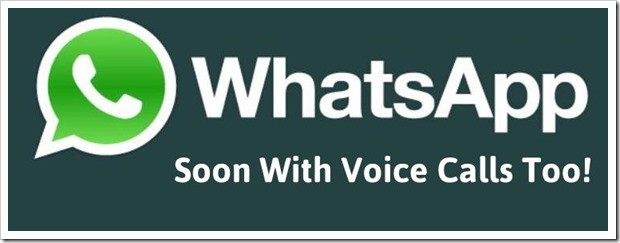I don’t think Whatsapp needs any introduction anymore. It is the $19 billion app that has over 400 million users and all this for doing a simple job- sending a message to someone using the same app.
However, that was yesterday. Tomorrow, the app will also provide its user the ability to have voice conversations.
At the ongoing Mobile World Congress 2014, Jan Koum, the founder and chief executive of Whatsapp, said that in the second quarter of this year, Q2-2014, Whatsapp will launch voice services to its app. Also, he said that while initially, the service would be for iOS and Android, it would later come to Blackberry and Windows phones as well.

WhatsApp already has voice messaging which they launched last year, but it looks like the service has not gotten all that popular.
In its years of functioning, Whatsapp has been a disruptive force with its text and multimedia messaging – an app that defied the Google logic by serving no ads and Apple logic by making the app free initially.
Also, this piece of software is probably single-handedly responsible for the death of messaging service. With the aim for voice services, it is a very interesting thought what might this app do.
In Koum’s own words-
“We think we’ll have the best voice product out there. It’ll use the least amount of bandwidth and we’re going to optimize the hell out of it.”
Of course, it is of note that Whatsapp will not be the first app that uses internet connection for calls. Skype, Viber and many other mobile & messaging apps already provide the same functionality. So, it is yet to be seen if the same impact that Whatsapp created in the messaging world will be replicated.
It is a point of concern for Telecom Operators as well because voice is still a major source of revenue for them. In fact, in countries like US or European countries, where the calling costs might be higher, if Whatsapp succeeds, it would be very harmful.
Interestingly, I do not see Whatsapp creating any dent in the Indian market.
As much as calling via internet might be cheaper, the calling rates are still too low for people to make a switch.
And people who are inclined to save money will not be using 3G or 4G services which are still required to have a good connection. 2G just won’t cut it in India for Whatsapp even if they optimize the data use to a max.
Also, the strength of Whatsapp (in my opinion) lies in the ability to make groups and broadcast messages in it. This and multimedia transfer makes it far different from the actual messaging service and won people over.
How can they make calling lucrative (by services and not cost) is for me the turning point and the crux of their success.
Until then, we wait for mid-year to find out what is brewing in the newly bought factory of Jan Koum.
Would love to hear your thoughts on this…
